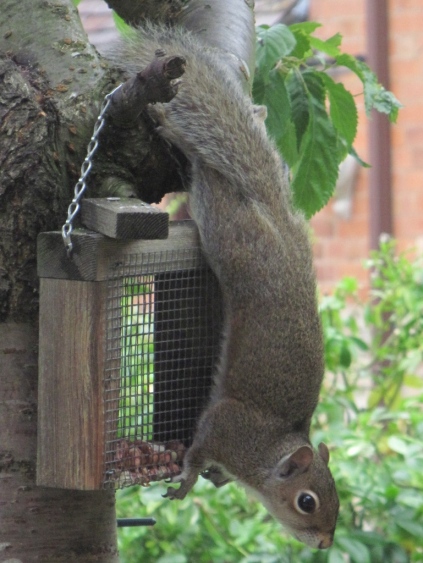I can never see the body of an animal at the side of the road without terrible pangs of sadness and regret – no matter that their death had nothing to do with me. I know that I’m soppy about all things small and furry, or fluffy or feathered (except spiders, and the mouse that ate my crème egg, and the magpie that killed a baby sparrow – ok, there’s quite a few exceptions) but many drivers must pass roadkill without a second thought, many probably don’t see them.
I started reflecting on this after seeing a dead squirrel while I was driving along thinking about a character in my current wip who has elevated himself from a bit part to being fairly vital to the story. The brief sketch of him I had in my head was fine for his previous role but now I need to know more and be sure he’s not a cardboard cut-out or nothing more than a hastily assembled handful of characteristics – or worst of all a harmful stereotype – just because he’s a villain doesn’t mean that that that’s all he is.

I read some marvellous advice recently that I heard before, but when you see it a couple of times close together it really sinks in – although that also means I have no idea whom to give credit to. It’s most usually applied to villains as a way to avoid clichés and it’s to simply remember that in his (or her) own story, the villain thinks they are the hero. They don’t sit around twirling their moustache and throwing puppies on the fire to flag up how evil they are – they get home on time to have dinner with their wife, take the dog for a walk and read their kids a bedtime story. They aren’t always in their lair plotting world domination, or if they are, they should have a better reason that wanting to destroy things – you only have to have look at prominent people in power at the moment to see that many of them (and their supporters) truly believe that they are doing things for good reasons and are making the world a better place; they see themselves as the hero saving the world, while we see them as destroying our future.
This advice of course holds for every character in a book, they are the hero of their own story. Sometimes this is obvious in a series where past and future protagonists show up; the fact that the author knows everything about them shines through, their voice and motivation are assured, their physical description is neither heavy handed nor sketchy or inconsistent, they leap off the page (occasionally to the detriment to of the supposed lead characters.) I’ve been guilty of having speaking characters who could just be farmer 1 and farmer 2 but that’s what later drafts are for, fleshing out those people and thinking what their story might be. It won’t impact the current story at all, but their voice will be more authentic. Even the person who shows up to deliver one piece of important news and is never seen again – we may not even know their name but they have a full life off page waiting for them to return.
Jennifer Crusie wrote a blog post some years ago when she was trying to nail down a character – I have searched for it to no avail, I think it was on a blog for one of the collaborative novels she wrote and looking for it means I have lost most of this morning reading the archives at Argh Ink, I’d almost forgotten how much great writing advice was there, along with possibly even greater humour. The gist of the post as I remember it was that Jenny asked “what would this character do if they hit a squirrel with their car?” I remember thinking “well I’d be horrified and upset – who wouldn’t? What character could I write who’d not feel that way? They’d be a monster.” Jenny went on to say that her character would feel remorse, but (possibly, I can’t quite remember) also annoyance and it gave her the key to that protagonist as being a reckless driver – not dangerous or cruel or unkind, just going a little too fast and not looking ahead for the pitfalls on the road, or in life.
I hadn’t used that particular device before when thinking about a character but it’s been invaluable this week. Many writers talk about interviewing their characters or have long lists of their likes and dislikes and taste in music, clothes, food etc. I have tended to plunder their pasts to see what made them this way, to ensure their motivation is strong enough, and I wrote about how what was on their book shelves or how they decorate their room can show the reader so much, rather than telling them.
I would never have thought I could write a character who wouldn’t care if they killed a defenceless animal by accident, even though I have written villains who have killed humans (always for what they think are valid reasons.) Maybe it’s the senseless nature of hitting an animal with a car, it can’t always be avoided but then most people would feel remorse or guilt. But what about the person who has just had such terrible news that they see nothing but the goal towards which they are driving? The parent dealing with squabbling children in the back seats? The lorry driver concentrating on some precious or fragile load? And conversely, just because an assassin is on their way to their next kill, they might still feel sadness or remorse if an animal starts across their path, as might the ruthless CEO who has just axed 500 jobs – or will he be more worried about his paintwork and coldly inform his chauffeur to clean the car as soon as possible?

There are many questions or scenarios to consider when fleshing out a fictional character and Jenny Crusie’s example has always stayed with me, even if I hadn’t used it. But as I pondered my secondary character and how vital he is making himself to the plot, I wondered how he would react if a squirrel darted in front of his car? I already know that his key emotions when dealing with my hero and heroine are selfishness and carelessness – the sort of person then who might not give a squished squirrel a second thought – but no, I knew that he would care, would be frustrated and annoyed at the incident, angry at the waste of life (even though he’s a man who shoots game birds competitively and for food.) Why would he care about a squirrel more than the effect he is having on my lead characters?
Selfish and careless; how he has become like that is not as important as what happens when he sees himself like that, when he finds out how others see him and what he has become by tiny steps – he doesn’t want to be an accidental squirrel killer, he wants to be the one who stops and takes it to a refuge to be healed – no, more than that, that’s what he thought he was, he does a huge amount for charities and good causes, but in his day to day life he’s forgotten to care. The book literally ends with him stripping naked, remembering the man he was, the one he thought he was, and the one he plans to become, discarding the trappings of power and revealing another truth he has hidden from himself, and from us. And meaning I have to write his story as well now.
So I have gained lot of character background and new insights into my villain, and therefore new thoughts about how he impacts my hero and heroine and how they will react. Everyone’s’ goals and motivations have been sharpened and more focussed as a result, and I’ve gained a sequel. All from looking at a deceased squirrel. Maybe its death wasn’t totally in vain.
